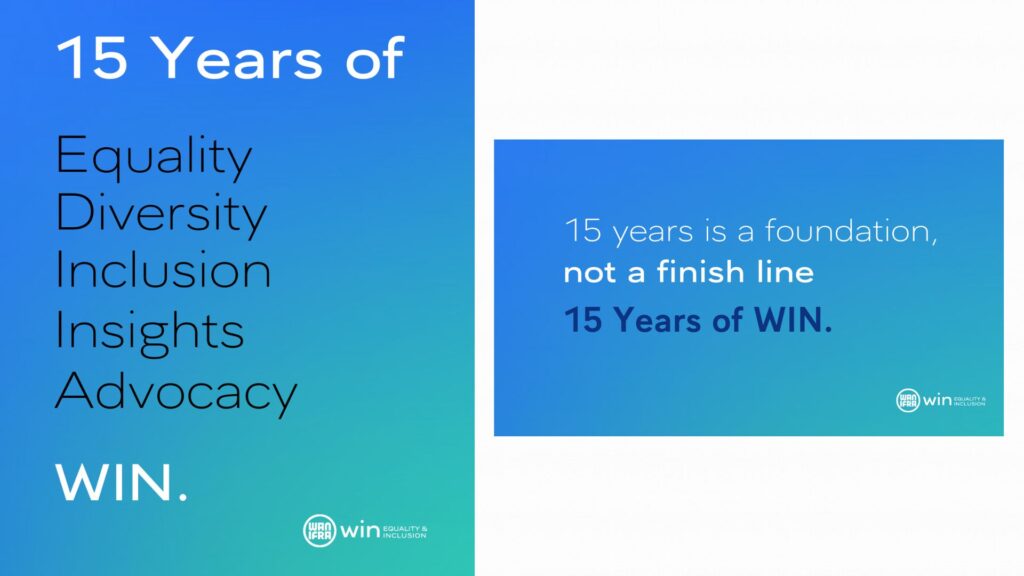By Melanie Walker
WIN began as a hypothesis: When applied alongside traditional media management capacity building, could concepts like mentoring, networking and career coaching – at the time uncommon in the media development sector – help accelerate the leadership journey for women media professionals?
We tested the theory in 2010 with a small group of mid-level media managers and newsroom editors, and saw immediate results: 30% of graduates reported a promotion or lateral move of their choosing within three months of completing the programme.
This number jumped significantly when viewed through a 6 and 12-month lens (up to 90%) – and has consistently repeated, year on year, as the programme expanded to 27 new countries across 5 continents, with more than 1,500 WINners (a term coined by graduates) progressing through the intensive 9-month curriculum to join the alum community.

Our team has grown as well, from 3 collaborators to more than 35; with an additional network of 30+ coaches and key experts, 90% of whom are based in our implementing countries.
WIN has partnered with more than 1,200 media organisations and trained over 7,000 (unique) media professionals on topics around online safety, digital strategy, inclusive leadership, change management, content strategy, ethics and investigative journalism.
WAN-IFRA has also recognised 18 outstanding newsroom leaders for their exemplary contributions through our WIN Editorial Leadership Award, first established in 2014 to inspire future newsroom leaders and bring attention to the continued gender gap at the most senior levels of newsroom and business leadership in media.
We’ve also built out our research and advocacy divisions to address systemic and emerging challenges. In 2020, WIN, in partnership with City University, led the largest-ever industry wide research on sexual harassment in newsrooms, surveying more than 2,000 media professionals from 20 markets.
This research has become a key resource in our advocacy work to educate and sensitise our partners on the prevalence of sexual harassment in newsrooms globally.
Our study showed that, on average, 41% of women journalists surveyed experienced verbal and/or physical harassment, and this number increased significantly in certain regions when disaggregated from the global findings.
We will revisit these figures in 2025 as we conduct a follow-up quantitative and qualitative study.
In 2020 we also formalised our work on sustainability, bringing into sharper focus WAN-IFRA’s belief that economic independence is a cornerstone of editorial independence, and that media must succeed as businesses to maintain this editorial freedom.
Recognising digital transformation as a major hurdle for many of our partners in emerging and fragile markets, we focused on rolling out practical capacity building programmes, such as our Digital ABCs series, through which more than 800 media managers have progressed.
Last but not least, our Social Impact Reporting Initiative (SIRI) grants have helped to bring more than 5,000 stories to audiences around the world.
From the effects of water pollution on women in Zimbabwean villages, and how Ukrainian women try to find their husbands who have gone missing during the full-scale war, to the dual burden of illness and war in Gaza, SIRI grants have elevated the experiences and opinions of hundreds of voices, and in doing so, also shone a light on marginalised communities and experiences.
Our journey, however, hasn’t been without its obstacles.
The barriers perpetuating exclusion and inequality remain deeply entrenched, globally.
In five years of tracking gender balance in content among our partners and non-partners, we have recorded no perceptible improvement in women’s representation in content, reflecting a global trend where women receive bylines, or feature as experts or protagonists, in only one out of every four stories.
This underrepresentation mirrors the leadership landscape, where women also take up only 1 in 4 of the top posts in media.
While remaining far below our targets of parity, we have seen some improvements since 2022: women now make up 24% of top commercial and editorial positions, up from 21%.
Although some improvements can be observed. (2024 figures to be released later next month).


Principles of gender equality and inclusion are human rights that are facing global pushback fuelled by social misconceptions, political realignments and broader financial concerns.
WIN’s work continues to stand as a powerful counterpoint to these challenges, proving that inclusive practices are not just ethically necessary, but also crucial for business.
In an era of declining trust in media and widespread misinformation, bringing diverse voices and perspectives into newsrooms can lead to more nuanced and accurate reporting, creative problem-solving, and generate fresh ideas.
Greater inclusivity can unlock access to new audiences, create new revenue streams and help bridge the growing trust gap between media organisations and their audiences.
Fifteen years is a foundation, not a finish line.
As we celebrate this milestone we invite you to join us – whether as a participant or partner in our programmes, to help amplify our advocacy and engagement efforts, or by supporting our work through your expertise or resources.
Please reach out if you would like to get involved.
Together, we can build a more equitable and inclusive media industry.
Because together, we WIN.
Melanie Walker, Executive Director for Media Development and Women in News





